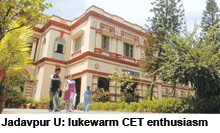West Bengal: Postgrad CET storm
The ruling Trinamool Congress government of West Bengal, after ousting the Communist Party of India-Marxist (CPM) led-Left Front government which ruled this eastern seaboard state uninterruptedly for 34 years in the historic state legislative election of 2011, is set to celebrate the second anniversary of that famous victory in May. One of its major pre-election promises was to overhaul the higher education system and raise overall standards of education in West Bengal. But two years on, this pre-poll promise has remained unfulfilled.
Specifically, one of the pre-poll promises of the TMC was to discontinue the routine reservation of postgraduate seats by top-ranked colleges and universities for their own graduates. In pursuance of redeeming this promise, on September 4 last year the West Bengal Higher Education Council (WBHEC) decreed a common entrance test (CET) for admission into postgraduate courses of all colleges and state universities for the academic year 2013-14. Under a revised exam-inations time-table, WBHEC directed all higher ed institutions to complete conducting their final year undergrad part III exams between March 15-May 15, to facilitate holding of the postgrad CET exam in June. The exam was proposed to be held within three weeks of the completion of the undergraduate exams as the level of preparations needed for both are same.
 However, the TMC government’s postgrad CET admissions decision, applicable to all colleges and universities statewide, has less than enthused undergrads in Kolkata’s elite Presidency College and Jadavpur University (JU). Having swotted furiously in their higher secondary years to enter the state’s most cherished institutions of higher education, and looking forward to easy passage into their Masters programmes through internal evaluation, they don’t appreciate the prospect of swotting again for CET.
However, the TMC government’s postgrad CET admissions decision, applicable to all colleges and universities statewide, has less than enthused undergrads in Kolkata’s elite Presidency College and Jadavpur University (JU). Having swotted furiously in their higher secondary years to enter the state’s most cherished institutions of higher education, and looking forward to easy passage into their Masters programmes through internal evaluation, they don’t appreciate the prospect of swotting again for CET.
Even the faculties of Kolkata’s elite colleges/universities are content to teach these institutions’ upper middle class students. The prospect of teaching students from colleges in the hinterland is far from inviting. Prof. Omprakash Mishra of JU’s faculty of International Relations, believes that admitting CET top-rankers will alter the unique character and camaraderie of JU. “Different universities have different standards. Imposing CET on autono-mous universities will erode their autonomy and change their character,” he warns.
West Bengal’s top-ranked universities are opposed to CET for esoteric reasons. “Students signed up for under-grad programmes under the faculties of comparative literature and international relations and who wish to study further, have no alternative but to continue in Jadavpur because other colleges and universities don’t offer these subjects. Besides, a highly-competitive CET requiring intense preparation will decrease the number of students opting for postgraduate studies. A better option would be to increase postgrad capacity to admit external students,’’ says Rubaiyat Biswas, a comparative literature student and member of the Arts Faculty Students’ Union of Jadavpur University.
Furious opposition to the CET has prompted rethinking in the state government. “We are taking note of reactions of academia, teachers and students. But it’s important to appreciate that CET creates a level playing field for all postgrad aspirants and serves the objective of social inclusion. Opposing CET is elitist and promotes mediocrity and social discrimination,” argues Sugata Marjit, chairman of WBHEC.
Dr. Prithwis Mukherjee, professor of management at IIT-Kharagpur, supports WBHEC’s stand on the issue. “A well-designed CET conducted by an independent third party is self-evidently fairer than a host of tests conducted by a plethora of colleges. JU and Presidency are wrong in opposing CET. Instead of wasting time and energy on conducting multiple examinations, they should demand a role in the design, conduct and supervision of a common entrance examination,” says Mukherjee.
Baishali Mukherjee (Kolkata)















Add comment